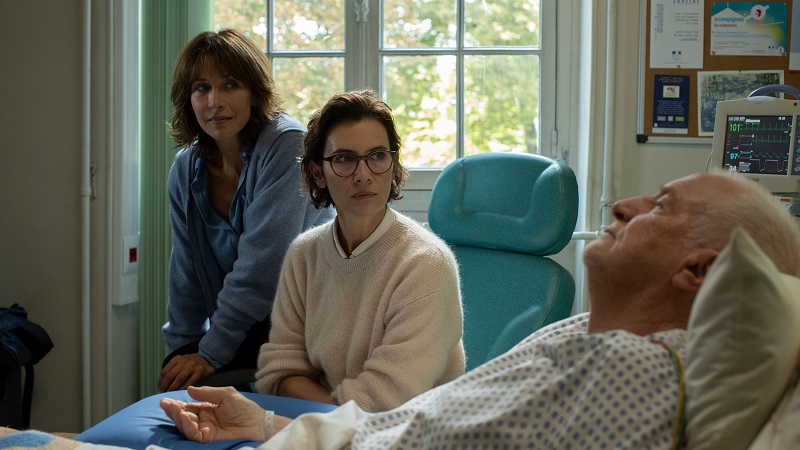Everything Went Fine (Ozon, 2021)
Right about the time that André tells his daughter Emmanuèle (Sophie Marceau) that he wants her help terminating his post-stroke life on his own terms, the plot of Everything Went Fine transforms into an entirely predictable procedural.
The unwinding of that procedural, though, is so minutely observed and carefully told, that the film hardly feels stale. In a pivotal scene, daughter tells dad that she has investigated the option of assisted suicide but that it is “too dangerous.” “For who?” he asks, dismissively. “For me,” she replies.
That exchange signals that we are in a movie for and about grown-ups. In a more ideological film, the daughter would be unreservedly on board, the obstacles would only be government interference, and the emotions more strident. Or Dad would be the unequivocal victim, and the movie would berate the daughter (and us) for caring about anything, anything at all, other than the wishes of the dying.
In another well-executed scene, Emmanuèle contorts her face while looking in the mirror, making it resemble the protruding lips and drooping eyes of her post-stroke father. Is she imagining what he feels? Or merely taking a few moments of privacy to mimic the grotesque ugliness (both in his countenance and character) that she has to spend most of her time pretending not to be bothered by?
One of the things the film absolutely nails is the cruel but logical narcissism of the dying, and how the death process spirals outward to force everyone in its immediate vicinity (not just the dying person) to treat it as the moment’s top priority. I had a loved one go through a prolonged dying stage, and she expressed to me perfectly the clarity with which she understood that any half-wish of the dying takes on the emotional weight of a demand, and any full request is packed with the stress of an ultimatum.
I suppose the film triggered some personal buttons as well in the way that Emmanuèle sees her father be cruel to some people he loved once and for whom she still cares. There are fewer emotional traps more painful than having to choose between a dying loved one who you think is wrong about something but who is also entirely vulnerable and dependent. During such times, it is the principled person indeed who can stay true to her own values while recognizing the autonomy of another person to make his or her own mistakes. There is a fine line between enabling another’s cruelty and respecting their difficult but understandable attempts to make their own decisions.
I also appreciated the way the film was more respectful of religion than I am used to seeing from contemporary pieces about end-of-life issues. When one stage of André’s process is temporarily delayed by an ambulance driver who says his religion forbids him from participating in another’s suicide, the man berates the helper, calling religion silly and stupid. Never mind the fact that it is the same religious convictions that motivate the helpers to help in the first place — or that the laws of church and state might be interested in protecting the rights of the vulnerable and not just interfering with the wishes of the comfortable. “I wonder how the poor do it?” André asks at one point. But he never pursues that thought to its painful but logical conclusion, that even in his death he is more privileged than most. It is a bitter pill for him that he has less choice than at any point in his life, and that lack of freedom makes him feel his life is no longer worth living. In that exchange the movie sees, what he doesn’t, what is the irksome state of his final life stage is the normal state through most of life for those less privileged. The title Everything Went Fine is a perfect encapsulation of the film’s moral ambivalence. Even under the best of circumstances (and André has it far better than most), it is impossible to make a society that is fair and just for everyone, where the wishes of some do not carry more weight than those of others. Perhaps the biggest indignity about death is that it is the stage of life when we all experience that injustice and vulnerability no matter how sheltered and privileged what has gone before has been.

